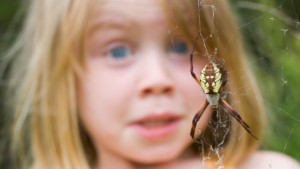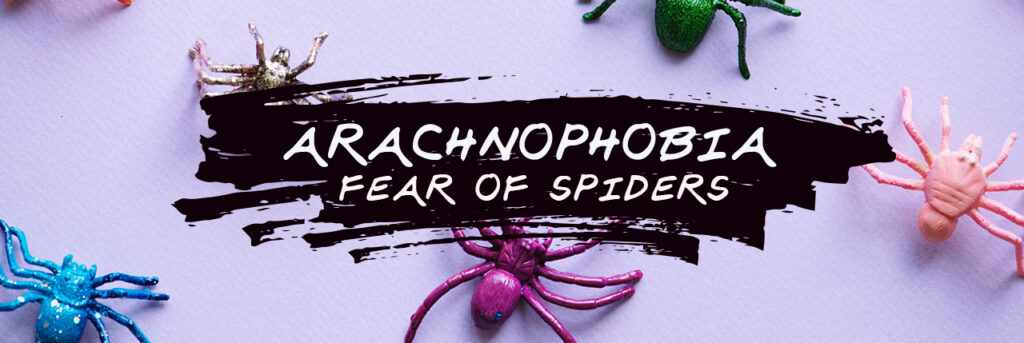Contents
- 1 What Is Arachnophobia?
- 2 Signs Of Arachnophobia
- 3 Causes Of Arachnophobia
- 4 Who Is More Likely To Suffer From Arachnophobia?
- 5 How Arachnophobia Can Affect Your Life?
- 6 Tips To Prevent Arachnophobia In Children
- 7 Treatment Of Arachnophobia
- 8 Tips To Deal With Arachnophobia
- 9 Conclusion
- 10 A Word From Therapy Mantra
What Is Arachnophobia?

Arachnophobia is the fear of spiders. This phobia can manifest itself in different ways, but usually it causes people to feel intense fear, anxiety and disgust when they see a spider or even think about them. In some cases, arachnophobia can be so severe that it can keep people from living normal lives.
Arachnophobia is one of the most common phobias in the world. It is estimated that between 3% and 18% of the population suffers from this fear. The majority of those who have arachnophobia are women. Arachnophobia can develop at any age, but it is most common in children.
Signs Of Arachnophobia
People who have arachnophobia often experience a number of different symptoms. The most common symptoms are-

- Fear
- Anxiety
- Disgust
- Racing heart
- Sweating
- Nausea or dizziness
Symptoms usually appears when they see a spider or think about them. In some cases, people may avoid situations where they might see a spider or be so scared of them that they can’t even leave their house.
Causes Of Arachnophobia
Arachnophobia can be caused by several factors, but it is most commonly inherited or developed after an especially traumatic event involving spiders occurred in someone’s childhood. There are several theories about what causes this type of phobia; however, the exact cause has yet to be determined conclusively by researchers in the field.
Arachnophobia is an irrational fear of spiders. It can be caused by a number of different things, including-
- Fear of the unknown
- A fear of being bitten or hurt
- Scary spiders’ appearance
Most typically, it is a phobia that people can trace back to a traumatic event, usually when they were very young.
It’s a question many people have asked themselves at one time or another. Here are some common theories about what causes the frightful sensation associated with this type of phobia.
It may be inherited

Many experts believe that arachnophobia could be hereditary, which means that it is passed down from parent to child. If both parents have an intense fear of spiders then it may very well be likely that their children will experience the same reactions as they do when they encounter spiders.
It may be caused by traumatic events
Another theory is that the phobia could have been brought on by a particularly bad experience or event, such as being bitten by a spider or seeing one killed in front of you. This type of fear typically manifests itself during childhood, which is why so many people associate arachnophobia with their experiences as kids.
Spiders are often used to represent evil
A common belief about what causes arachnophobia is that it stems from the symbolism associated with spiders throughout history. Many consider them to be symbols of evil and darkness, which can make some people uncomfortable around them at first glance. Whether this triggers feelings of anxiety or sheer terror depends on the person’s personal experiences combined with the symbolism that they have taken away from the encounter.
It may be a result of the human brain
One fascinating theory is that humans experience arachnophobia because our brains are simply hard-wired that way. There are certain aspects of spider biology, such as their eight legs and irregular shape, which contribute to this phobia in many people.
Who Is More Likely To Suffer From Arachnophobia?

Arachnophobia is more common in women than in men. This fear can develop at any age, but it is most common in children. There are a number of different causes for this phobia, but the majority of people who suffer from it can trace it back to a traumatic event. Arachnophobia can keep people from living normal lives and can cause them to experience a number of different symptoms, such as fear, anxiety, and disgust.
How Arachnophobia Can Affect Your Life?
Arachnophobia can have a significant impact on your life if left untreated.
For starters, it can prevent you from doing the things you love or from going to the places you want to go. Many people with arachnophobia are so scared of spiders that they avoid leaving their house altogether. This can lead to feelings of isolation and depression.
In addition, arachnophobia can cause a number of different physical symptoms, such as a racing heart, sweating, and nausea. These symptoms can make it difficult for you to concentrate or to perform well at work or school. They can also cause you to feel anxious and uneasy all the time.
Tips To Prevent Arachnophobia In Children

There are a number of different tips that parents can use to help prevent arachnophobia from developing in their children. Some of these tips include-
1. Don’t scare your child with stories about spiders
Many parents may inadvertently scare their kids by telling them horror stories about spiders. This can cause them to develop a fear of these creatures before they even have a chance to know what they’re like. It’s important to be positive around your kids when it comes to spiders and other animals, so they don’t feel scared or anxious when they encounter them later on in life.
2. Show them pictures of little spiders
On the flip side, you can also help desensitize your child by showing them pictures of spiders. This can help them to see that they aren’t so scary and may even be able to handle a spider without experiencing any fear at all.
3. Talk about the differences between spiders and insects
Some children become afraid of spiders when they’re told that they’re just like insects, such as ants or termites, because they crawl on their hands when you’re sleeping. It’s important to talk about the differences between these creatures with your child in order to keep them from feeling this way when they encounter them for the first time.
4. Teach your kids not to hurt arachnids
It’s important for parents to teach their children not to play or hurt bugs or arachnids. There are many different types of bugs, such as beetles and butterflies, which can be mistaken for spiders if they’re not familiar with them. This can lead to increased anxiety when the child sees insects or even spider webs that aren’t actually there.
5. Let your kids know that you’re scared of spiders too
Many parents want their children to grow up tougher than they are, but it’s important to let them know that everyone has certain fears that limit their behavior at times during their lives. You can help make them feel better by letting them know how you feel about spiders and showing them examples of videos on YouTube where people who have arachnophobia overcome their fear of these creatures in order to keep their homes safe from unwelcome pests.
There are many other ways that parents can help their children to overcome arachnophobia, but these are some of the most effective tips. Spiders should be beneficial to people and the environment, so there’s no reason for them not to like them or play with them if they want to.
Treatment Of Arachnophobia

There is no one-size-fits-all approach to treating arachnophobia. However, there are a few different methods that have been shown to be effective in helping people overcome their fear of spiders.
CBT
The most common treatment for arachnophobia is cognitive behavioral therapy (CBT). This type of therapy helps people change the way they think about spiders and thus helps them overcome their fear. CBT usually involves a therapist helping a person gradually expose themselves to spiders in a safe and controlled environment.
Exposure therapy
Some people also find relief from exposure therapy, which involves gradually exposing oneself to spiders until they become desensitized to them. You can get this therapy with the help of a therapist or on one’s own. It is important to note that you should not do these two methods alone but with the help of a professional.
Beta blockers
Another method of treating arachnophobia is by taking beta blockers. These medications keep the physical symptoms of fear from occurring. This makes it easier for a person to interact with spiders. Beta blockers must be prescribed by a doctor and can take about ten days before they start working. So they aren’t as effective as talk therapy or exposure therapy.
Support groups
Support groups are another good option for those who have arachnophobia. Because they allow people to connect with others who have similar phobias and reduce feelings of loneliness and isolation. That often come with having this kind of phobia.
Tips To Deal With Arachnophobia

Arachnophobia is a common fear among adults, and it can be difficult to deal with if you’re not careful. It’s important to remember that while spiders may make some people uncomfortable or fearful, they are generally harmless creatures that we need in our environment. If you find yourself having trouble dealing with arachnophobia, try these tips:
- Look at pictures of baby spiders or tarantulas without their legs first before viewing images of full-grown ones; the picture will seem less threatening because your brain associates them as babies rather than mature versions.
- Practice exposure therapy by visiting an animal petting zoo where there are plenty of live animals such as goats and sheep for kids who have a hard time separating farm animals from scary spiders.
- Practice meditation and deep breathing exercises to calm your nerves before a spider encounter.
- It might help you to try eating a small amount of chocolate or drinking a warm cup of tea if you feel particularly anxious when encountering spiders in your home; the chemicals found in these items tend to cause people to relax and become calmer.
Conclusion
Arachnophobia, or the fear of spiders, is a common condition that affects millions of people every year. While it is sometimes difficult to treat this phobia. But there are many safe and effective methods for helping people deal with their fear of spiders. If you are struggling with arachnophobia, it is important to remember that you are not alone. And there are people who can help you overcome your fear. If you or some one you know is suffering from this disorder, then feel free to contact us. Our experienced therapist are there to provide help.
A Word From Therapy Mantra
Your mental health — Your psychological, emotional, and social well-being — has an impact on every aspect of your life. Positive mental health essentially allows you to effectively deal with life’s everyday challenges.
At Therapy Mantra, we have a team of therapists who provide affordable online therapy to assist you with issues such as depression, anxiety, stress, workplace Issues, addiction, relationship, OCD, LGBTQ, and PTSD. You can book a free therapy or download our free Android or iOS app.


